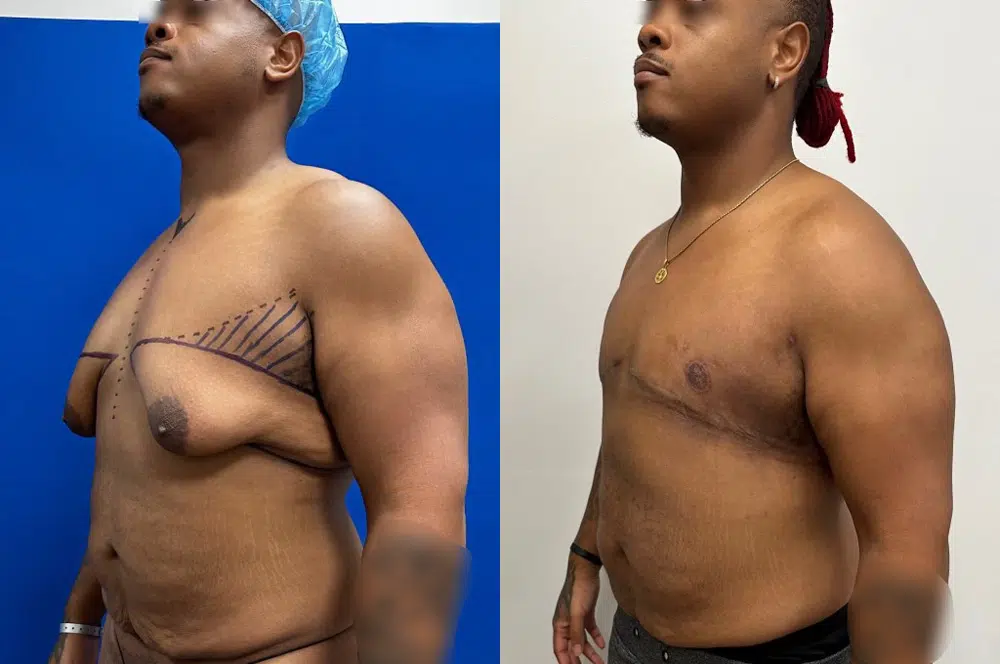Starting Price: $4,600
*Pricing Varies by Surgeon
"*" indicates required fields
Home / Surgical Procedures / Breast Procedures / Male Breast Procedures
More formally referred to as gynecomastia surgery, gyno surgery is a surgical procedure performed to remove excess male breast tissue. Although not a health concern, the formation of breast tissue in men (gynecomastia) can have an extremely negative impact on self-esteem, often causing men to avoid sports, intimacy, swimming, and other pursuits that make it difficult to hide the chest. If you or a loved one is struggling with gynecomastia, gyno surgery can help.

This actual Mia Aesthetics gyno surgery patient enjoyed optimal results after following post-op instructions.
Post-gyno surgery results will vary, but our surgeons are highly trained to give you the best results possible.
In order to be a good candidate for gyno surgery, you must first stop taking any drugs or medications that can cause the condition. Illegal drugs and some prescription medications can cause the problem. If you continue taking them after gyno surgery, it’s likely your unwanted breast tissue will simply come back.
Your age is also relevant to your gyno surgery candidacy. Breast enlargement is not uncommon in teenage boys. To make sure the problem doesn’t return after surgery, it’s best to wait and perform gyno surgery after puberty.
Otherwise, being a good candidate for gyno surgery is the same as it is for most surgical procedures. It’s best if you’re close to your ideal weight, generally healthy, and have any chronic health conditions under control. You should avoid smoking and alcohol consumption before and during your recovery period. It’s also best if you have adequate time to devote to healing and have realistic expectations about what the surgery can and can’t do for you.
Performed as an outpatient procedure, gyno surgery usually takes about 2 hours to complete. Expect to be at the clinic for more than 2 hours, however, as we will need time to prep you for surgery and will monitor you for a time as you come out of anesthesia.
After your surgery you may feel groggy and spend the rest of the day napping. While the surgery itself may take only a few hours, you should plan on resting and recovering for the entire day. You should keep someone with you the day you receive anesthesia, and you likely won’t be up to seeing many visitors or tagging along for errands.
After gyno surgery, you may have drains in your incisions for a week or two to avoid fluid buildup. If so, you will need to empty and clean them periodically, but we’ll show you how to do this before you leave the clinic. Your surgeon will likely remove these during your post-op visit. You’ll also want to avoid sexual and other activities that can cause friction against your chest for two weeks.
Patients may experience mild to moderate pain and discomfort, but this is easily controlled with prescription pain medications. Most patients can return to a desk job 5 to 7 days after surgery. You’ll need to wear a compression garment on your chest to minimize swelling for about 6 weeks. This is a minor inconvenience and usually not an issue for patients.
Generally, most patients can resume light exercise and activity about 2 weeks after gyno surgery. You can then increase your exercise level gradually as instructed by your surgeon and tolerated by your body. You should wait about 6 weeks to add strength training back into your regimen, however. Chest and arm workouts should wait until you are fully healed.
Once you resume your normal workout routine, we encourage you to continue it indefinitely. Regular workouts and a healthy lifestyle are the best ways to maintain your new body shape after gyno surgery.
Like all surgeries, gyno surgery can leave behind scars. Exactly where on your chest they fall and how prominent they are varies from one patient to the next. Experienced plastic surgeons always make scars as small as possible and try to hide them in the natural contours of your body, and they’re quite good at it. Your scars will likely be visible but not overpowering or super noticeable. Scars tend to fade over time, and you can help them along with silicone or vitamin E treatments.
